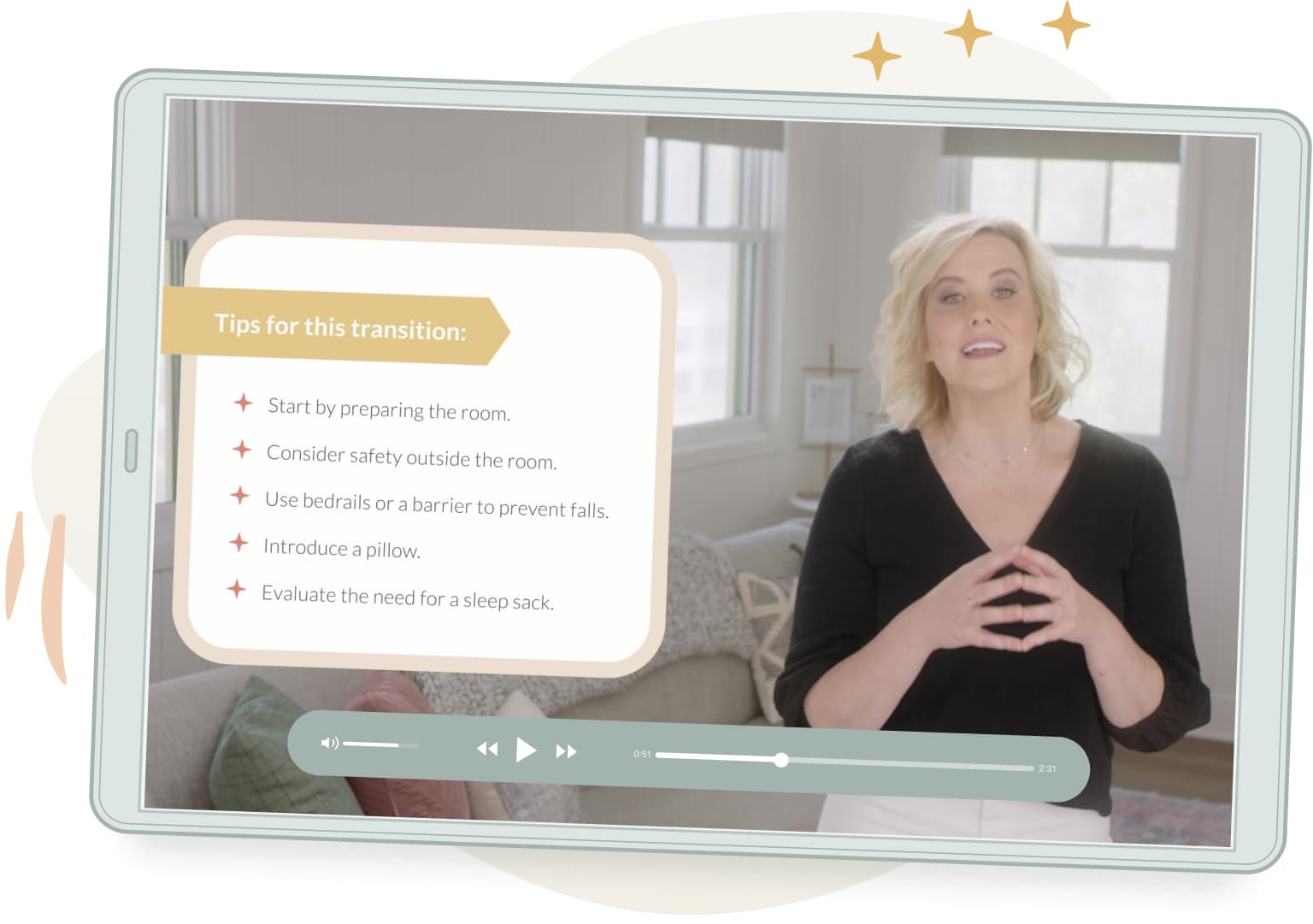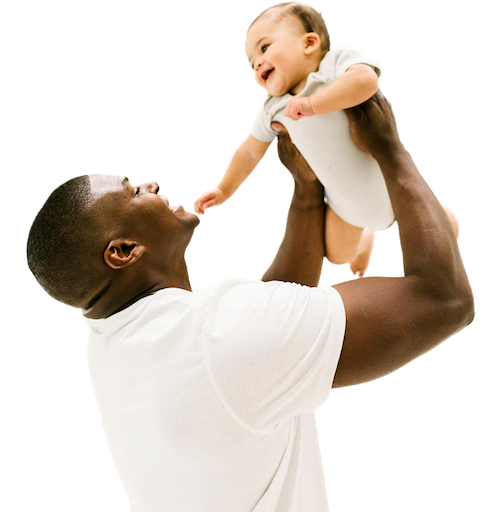I love 2 year olds! Often, 2 year olds get a bad rap because of the "Terrible Twos," but the truth is, 2 year olds are so fun with their busy brains and busy bodies. Unfortunately, all of this busy energy can sometimes lead to a struggle with sleep, which is often called the 2 year old sleep regression. I’d love to talk about it.

Toddler Sleep Training
stars ( reviews)
You don’t need to troubleshoot endlessly or struggle alone. If sleep is hard for your 2 year old, my Toddler Sleep Training class is here for you. I’ll teach you everything you need to confidently set your toddler up for restful naps and nights. You don’t have to wait, you can get started today.
Learn MoreWhat is a sleep regression? anchor
When a little one’s sleep becomes disrupted, many people refer to this as a sleep regression. Sleep regressions are often associated with developmental progression. When toddlers experience growth (physical, mental, emotional), sleep can be impacted. Their brains and bodies are working hard!
Are sleep regressions based in science?anchor
When a little one’s brain is busy learning new things or developing, sleep can take a back seat.(6,7) Also, as children grow, their sleep needs change.(3,4,5) This means a little one may begin to struggle with more night wakings, with nap refusals, and with falling asleep. When sleep is interrupted this way, it can feel like everything is moving backwards, hence the term “sleep regression.”
However, sleep isn’t actually going backwards or permanently “regressing.” Sleep skills don’t just disappear at magical ages. When I talk about common sleep regression ages, I’m talking about ages when babies and toddlers often experience periods of development (physical, cognitive, social) or commonly have a change in sleep needs (Think fewer naps, more awake time, etc..). But truly, all babies develop at their own pace, meaning sleep could be interrupted because of new skills, cognitive progressions, or physical shifts at any age.
Is there a sleep regression at 2 years old or 2.5 years old?anchor
Yes! It’s normal for your 2 year old or 2.5 year old to experience changes in sleep. At this age, toddlers are experiencing significant development. There may also be life changes happening around this time that can impact sleep (e.g. new sibling, starting school or daycare, potty training).
Can I talk you through my approach to sleep regressions?
What are some signs of the 2 year sleep regression? anchor
A sleep regression is when your little one experiences a sudden disruption or change in sleep. This could look like:
Your 2 year old waking up in the middle of the night – either a reappearance of night wakings or increased frequency of middle-of-the-night wakings.
Your 2.5 year old is waking early in the morning – these either reappear when they were previously resolved, or they become a new issue.
Nap time is a struggle – your 2 year old is now taking a long time to settle/fall asleep for naps, naps have become shorter and/or more disrupted, or your toddler completely refuses to nap.
Your 2 year old is fighting bedtime – it’s like they’re thinking of all the ways they can stall during the bedtime routine. Or maybe there is a significant increase or change in protesting bedtime, like taking a long time to fall asleep, crying, calling out for you, etc.
What causes the 2 year old sleep regression? anchor
When your little one’s brain is going through huge developmental changes, sleep can be affected. Here's what I want you to know: Sleep regressions, like the 2 year old sleep regression, are a sign of developmental progressions. Your toddler’s brain is working hard!
At 2 years old(2), your toddler is learning new physical skills like jumping, climbing, and throwing or kicking balls. They are also engaging in more focused play like puzzles, towers, taking turns, etc.. You may have noticed they are really starting to “pretend” and acting out the things they see people doing throughout the day!
Your toddler is also going through huge cognitive changes(5) that lead to following two-step commands, increasing memory, blossoming imagination, growing independence, and sometimes testing limits. Between 18-26 months, toddlers learn their voice matters. They are learning “I can use my voice to impact change!”
Besides the physical and cognitive changes, there can also be other reasons your toddler is experiencing a sleep regression.
If you’ve noticed an increase in bedtime battles, it’s possible your 2 year old is expressing a fear of the dark. Your toddler being afraid of the dark can look like getting upset when the lights are turned off or wanting the lights to remain on. It may be helpful to introduce a night light if this is happening.
Another possible reason your 2 year old is going through a sleep regression could be separation anxiety. Aim to spend 10-15 minutes of intentional 1-on-1 time with your 2 year old during the day. This undivided attention can make a big difference at bedtime by giving your toddler the quality time they’re craving from you.
Although teething is not a common cause of a sleep regression, 2 year molars(4) begin to come in around 2-2.5 years and may affect sleep for a brief period.
How long does the 2 -year-old sleep regression last?anchor
Sleep regressions related to developmental progression are temporary! They can last just a few days to several weeks. I know it can be tough when you’re operating on less sleep, but remaining consistent with routines and holding firm to boundaries can be so helpful for making it through the 2 year old sleep regression. If we introduce new habits during a regression, a temporary setback can become a long-term struggle. If sleep has always been tough or you'd like more step-by-step guidance for your days and nights, my Toddler Sleep Training class will give you everything you need to confidently set your toddler up for restful and independent sleep.
My 2 year old is refusing to nap. Does this mean we should drop the nap? anchor
Not yet! Most toddlers need a nap until around age 4(6). Nap refusals at 2 years old are a common sign of the sleep regression. Instead of dropping the nap, stay consistent with your healthy sleep habits and routines.
If your 2 year old is fighting naps, it may be time to evaluate how much sleep your 2 year old is getting each day. Most 2 year olds need 11-14 hours of sleep in a 24 hour period, with a goal of 10-12 hours of night sleep and 1.5-3 hours of day sleep. Take a look at Toddler Nap Schedules for 2, 3, and 4 year olds for more guidance.
How long should I let my toddler cry during a regression? anchor
I understand why you might be asking this question. When it feels like sleep is falling apart, you may be wondering what other options you have besides simply letting your toddler cry. But I want to tell you: You don't have to let your toddler simply cry out of desperation. You can have a plan to confidently help your toddler sleep independently while remaining emotionally attached and limiting tears.
In my Toddler Sleep Training class, I'll walk you step-by-step through a holistic, fully-customizable approach to independent sleep for your toddler. It doesn't mean that your toddler won't cry at all, but it does mean that you'll do everything you can to minimize tears, prepare your toddler for sleep, and walk alongside them every step of the way.
Should I let my toddler sleep in my bed during a regression? anchor
Sleep regressions can be so tough! It might seem that bringing your toddler into your bed will be a quick fix, but it could lead to new expectations for sleep. I don’t recommend allowing your toddler to sleep in your bed as a solution to sleep issues during a sleep regression – especially if this is not something you want to continue doing long term.
If you’ve been struggling with the 2 year regression and feel like you’ve run out of options, try the ideas below to get you started.
How can I help my 2 year old through a sleep regression? anchor
Stay flexible as your toddler’s sleep needs change. anchor
Remember, your little one still needs great sleep! Even if he can "choose" not to sleep, we want to maintain a nap AND a consistent bedtime(3)(ideally 7:00-8:00 p.m.). Pay attention to how long it takes your 2 year old to fall asleep. If falling asleep begins to take more than 30 minutes for naps or bedtime, it might be time to take another look at your daytime routine.
Introduce a lovey.anchor
2 years old is also a great time to introduce a lovey or favorite stuffed animal. This can help calm your toddler during bedtime since research shows(1) sleeping with a comfort object can help decrease sleep problems and nighttime fears.
Plan for lots of active play.anchor
Provide stimulating awake time with new activities. This doesn’t mean you have to come up with creative new ideas every day. Try things like going for a walk and looking for flowers, making an obstacle course, reading books, visiting the library, cooking together, playing in the sink, or building a tower out of blocks – check out these activities and developmental toys for more ideas. Keeping that body and brain active truly helps with consolidated sleep.
Be mindful of big transitions.anchor
Avoid too many new challenges at once. I know that the milestone of turning two makes it feel like your toddler is suddenly “big.” This can often lead to big transitions. Go slowly as you navigate potty training, eliminating the pacifier, moving out of the crib, etc. It doesn't have to be done NOW. Take your time, and if possible, try to follow your toddler’s lead.
Note: Now isn’t the best time to move out of the crib for most.
If you’ll be adding a baby to your family, it may help to avoid other major changes during the few months before and after the new baby’s arrival.
Stay consistent.anchor
Don’t start habits you don’t want to maintain. Inconsistency combined with limit testing and the desire for control can create long-term struggles. Hold firm to your boundaries: It will pay off for months to come!
What if sleep is still a struggle for my 2 year old?anchor
I have a class that can help! My Toddler Sleep Training helps your toddler become a great sleeper and meets them where they are developmentally using a holistic, customizable, and connection-driven approach. My goal is to get your toddler sleeping through the night and your family thriving through the toddler years.
References
10 Sources
Rafihi-Ferreira et al. (2018). Brief treatment for nighttime fears and co-sleeping problems: A randomized clinical trial.
American Academy of Pediatrics (2009). Developmental Milestones: 2 Year Olds. .
Paruthi et. al. (2016). Recommended Amount of Sleep for Pediatric Populations: A Consensus Statement of the American Academy of Sleep Medicine.
Kristeen Cherney. (2018). 2 Year Molars: Sympotoms, Remedies, and Everything Else..
Eftichia Andreadakis et al. (2018). How to Support Toddlers’ Autonomy: Socialization Practices Reported by Parents.
A.D.A.M. Medical Encyclopedia. (2020). Bedtime habits for infants and children. MedlinePlus..
Wielek, T. et al. (2019). On the development of sleep states in the first weeks of life.
Mindell J. et al. (2016). Development of infant and toddler sleep patterns: real-world data from a mobile application.
Healthy Children, American Academy of Pediatrics. (2022). Separation anxiety and sleeping.
Scher et. al. (2015). Sleep as a mirror of developmental transitions in infancy: The case of crawling.
Keep in mind that the information and content on this blog is for informational purposes and should not be considered medical advice. If you have questions about your child, please reach out to your doctor.








